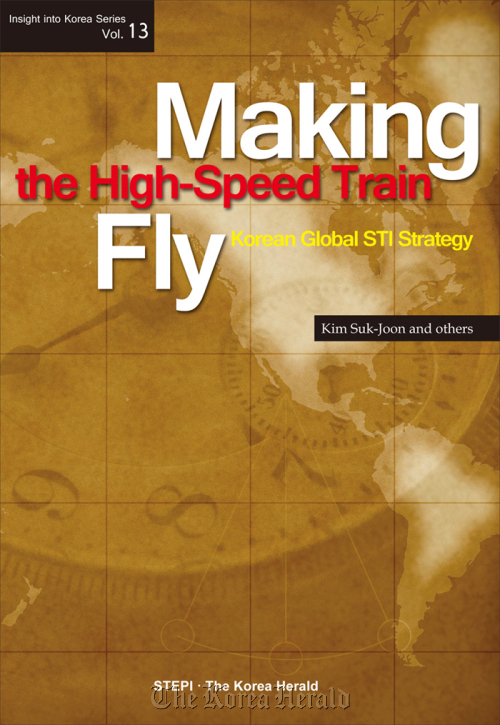New books in ‘Insight into Korea Series’
Making the High-Speed Train Fly:
Korean Global STI Strategy, Empowering Korea with New Innovations
By Kim Suk-joon and others
(Jimoondang)


The Korea Herald’s “Insight into Korea” book series, which previously dealt with key Korean issues including Dokdo, the Korean Wave, and various social and financial topics, has published two more volumes ― this time about the challenges Korea faces in R&D and science and technology.
The books ― “Making the High-Speed Train Fly: Korean Global STI Strategy” and “Empowering Korea with New Innovations” ― have been compiled from 46 in-depth articles written by the members of the Science and Technology Policy Institute that were published in The Korea Herald from spring of 2009 to May 2011.
“Making the High-Speed Train Fly: Korean Global STI Strategy” focuses on Korea’s policies in science and technology as well as R&D, featuring the development of the KTX as one of the topics. It consists of 19 articles that focus on the international aspect of the policies.
“Originally based on French TGV designs, the Korean high-speed train, the KTX, eventually developed its own domestic designs and technology to meet the demands of the Korean countryside,” wrote Kim Suk-joon of STEPI and Yu Kun-ha of The Korea Herald.
“This pattern of cooperation with global partnership to develop science and technology through domestic research and development activities, known as R&D, continues to meet our country’s needs and obligations.”
The articles of the book deal with how photovoltaic technology could save the planet; the history of North Korea’s nuclear program; ways of enhancing inter-Korean cooperation in science and technology; nurturing ”world-class“ scientists in Korea; and adopting English as the official language of science.
Meanwhile, “Empowering Korea with New Innovations” focuses on domestic science and technology as well as R&D polices that were launched to “increase innovation and economic performance” in Korea. The book is comprised of 24 articles written by STEPI researchers.
“In the recent years, the benefits of economic growth have not trickled down to the poor,” wrote Kim and Yu. “As a result, while the economy has continued to grow, poverty has been on the rise, aggravating social polarization. This has sharply increased demand for welfare, putting a strain on government finances ... R&D policy is no exception. The government needs to overhaul its R&D policy to ensure that it contributes to making economic development more inclusive and balanced.”
The featured articles, many of which delve into the ways in which S&T and R&D policies can ease social polarization, include Lee Yoon-jun’s “Bringing University Technology to Markets”; Hwang Seong-won and Jeong Gi-cheol’s “Fostering Science and Technology champions”; Ahn Doo-hyun and Song Wi-chin’s “Science and Technology for Underprivileged”; and Park Ki-beom and Min Chul-koo’s “State-Funded Research Institutes need Reform.”
(dyc@heraldcorp.com)
Making the High-Speed Train Fly:
Korean Global STI Strategy, Empowering Korea with New Innovations
By Kim Suk-joon and others
(Jimoondang)


The Korea Herald’s “Insight into Korea” book series, which previously dealt with key Korean issues including Dokdo, the Korean Wave, and various social and financial topics, has published two more volumes ― this time about the challenges Korea faces in R&D and science and technology.
The books ― “Making the High-Speed Train Fly: Korean Global STI Strategy” and “Empowering Korea with New Innovations” ― have been compiled from 46 in-depth articles written by the members of the Science and Technology Policy Institute that were published in The Korea Herald from spring of 2009 to May 2011.
“Making the High-Speed Train Fly: Korean Global STI Strategy” focuses on Korea’s policies in science and technology as well as R&D, featuring the development of the KTX as one of the topics. It consists of 19 articles that focus on the international aspect of the policies.
“Originally based on French TGV designs, the Korean high-speed train, the KTX, eventually developed its own domestic designs and technology to meet the demands of the Korean countryside,” wrote Kim Suk-joon of STEPI and Yu Kun-ha of The Korea Herald.
“This pattern of cooperation with global partnership to develop science and technology through domestic research and development activities, known as R&D, continues to meet our country’s needs and obligations.”
The articles of the book deal with how photovoltaic technology could save the planet; the history of North Korea’s nuclear program; ways of enhancing inter-Korean cooperation in science and technology; nurturing ”world-class“ scientists in Korea; and adopting English as the official language of science.
Meanwhile, “Empowering Korea with New Innovations” focuses on domestic science and technology as well as R&D polices that were launched to “increase innovation and economic performance” in Korea. The book is comprised of 24 articles written by STEPI researchers.
“In the recent years, the benefits of economic growth have not trickled down to the poor,” wrote Kim and Yu. “As a result, while the economy has continued to grow, poverty has been on the rise, aggravating social polarization. This has sharply increased demand for welfare, putting a strain on government finances ... R&D policy is no exception. The government needs to overhaul its R&D policy to ensure that it contributes to making economic development more inclusive and balanced.”
The featured articles, many of which delve into the ways in which S&T and R&D policies can ease social polarization, include Lee Yoon-jun’s “Bringing University Technology to Markets”; Hwang Seong-won and Jeong Gi-cheol’s “Fostering Science and Technology champions”; Ahn Doo-hyun and Song Wi-chin’s “Science and Technology for Underprivileged”; and Park Ki-beom and Min Chul-koo’s “State-Funded Research Institutes need Reform.”
(dyc@heraldcorp.com)







![[New faces of Assembly] Architect behind ‘audacious initiative’ believes in denuclearized North Korea](http://res.heraldm.com/phpwas/restmb_idxmake.php?idx=644&simg=/content/image/2024/05/01/20240501050627_0.jpg&u=20240502093000)










![[Today’s K-pop] Sunmi to drop single next month](http://res.heraldm.com/phpwas/restmb_idxmake.php?idx=642&simg=/content/image/2024/05/03/20240503050545_0.jpg&u=)